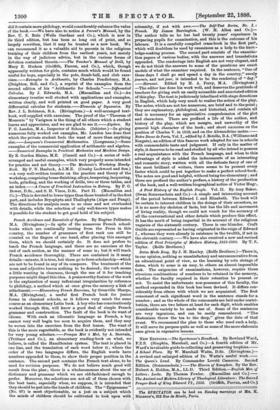French Accidence and Essentials of Syntax. By Eugene Pellissier, M.A.
(Rivingtons.)—In spite of the numerous French school- books which are continually issuing from the Press in this country, the number of grammars of first rank can still be counted on the fingers of one hand, after placing this amongst them, which we should certainly do. It does not profess to teach the French language, and there are no exercises at the end of each section, as the manner of some is ; but it will teach French accidence thoroughly. There are contained in it many details—minute, it is true, but these go to form scholarship—which are not to be found in any of its compeers. The treatment of the noun and adjective leaves nothing to be desired ; the verb seems a little wanting in clearness, though the use of it for teaching purposes might dispel this idea. A praiseworthy feature of the work is the explanation of many inflexional irregularities by reference to philology, a method which at once gives the memory a link of attachment.—Elementary French Exercises, by Granville Sharpe, M.A. (Rivingtons), a useful first French book for junior forms in classical schools, as it follows very much the same course as an elementary Latin book. A boy who has conscientiously worked through this, will know a good deal of simple French grammar and construction. The fault of the book is its want of idioms. With such an idiomatic language as French, a boy cannot very well begin too soon to acquire them, and they may be woven into the exercises from the first lesson. The want of this is the more regrettable, as the book is evidently not intended for very young scholars.—Presque Mot a Mot, by A. Sauvain, (Trubner and Co.), an elementary reading-book on what, we believe, is called the Hamiltonian system. The text is placed in one line, and the translation of each word below it ; where the order of the two languages differs, the English words have numbers appended to them, to show their proper position in the sentence. The second part contains the French text alone, to be used for revision purposes. We do not believe much good will result from the plan ; there is a wholesomeness about the use of dictionary and grammar which we are old-fashioned enough to prefer. Moreover, the selections are not all of them chosen with the best taste, especially when, we suppose, it is intended that they should be put into the hands of children. The " Epigramme " (No. 97) is most objectionable, as a jest on a subject which the minds of children should be cultivated to look upon with solemnity, if not with awe.—The Self-Test Series, No. I.: French. By James Berrington. (W. H. Allen and Co.)— The author tells us he has had twenty years' experience in preparing pupils for examination, and this is the outcome of his labours. It is a carefully compiled cram-book in the first part, which will doubtless be used by examinees as a help to the knov. - ledge-soaking process. The second part consists of the examina- tion papers of various bodies, with the answers and translations appended. The renderings into English are not very elegant, and we do not think the answers to some of the questions are exact models of what the examiner required. In the sentence, "One of these days I shall go and spend a day in the country," surely journee, and not jour, is intended to be the rendering of " day." —Hernani. Edited by H. A. Perry, M.A. (Rivingtons.) —The editor has done his work well, and deserves the gratitude of teachers for giving such an easily accessible and annotated edition of this play. The text is judiciously interlined with stage directions in English, which help very much to realise the action of the play. The notes, which are not too numerous, are brief and to the point ; they are explanatory, philological, and historical, and contain all that is necessary for an appreciative comprehension of the plot and characters. There are prefixed a life of the author, and history of the play, which are meagre, and unworthy of the general high character of the book ; and short excursus on the position of Charles V. in 1519, and on. the Alexandrine metre.— Notre Dame de Paris, Vol. I., edited by J. Bolelle, B.A. (Williams and Norgate), an edition of this famous work adapted for use in schools with commendable taste and judgment. If only in the matter of style, it deserves to be read and studied by all who intend to possess a real acquaintance with the French language, and when to this advantage of style is added the inducements of an interesting and romantic story, vrsitten with all the delicate fancy of one of the most brilliant of writers, there seems to be present every factor which could be put together to make a perfect school-book. The notes are good and helpful, without being too elementary ; and there are prefixed the author's preface, a history of the production of the book, and a well-written biographical notice of Victor Huge.


































 Previous page
Previous page